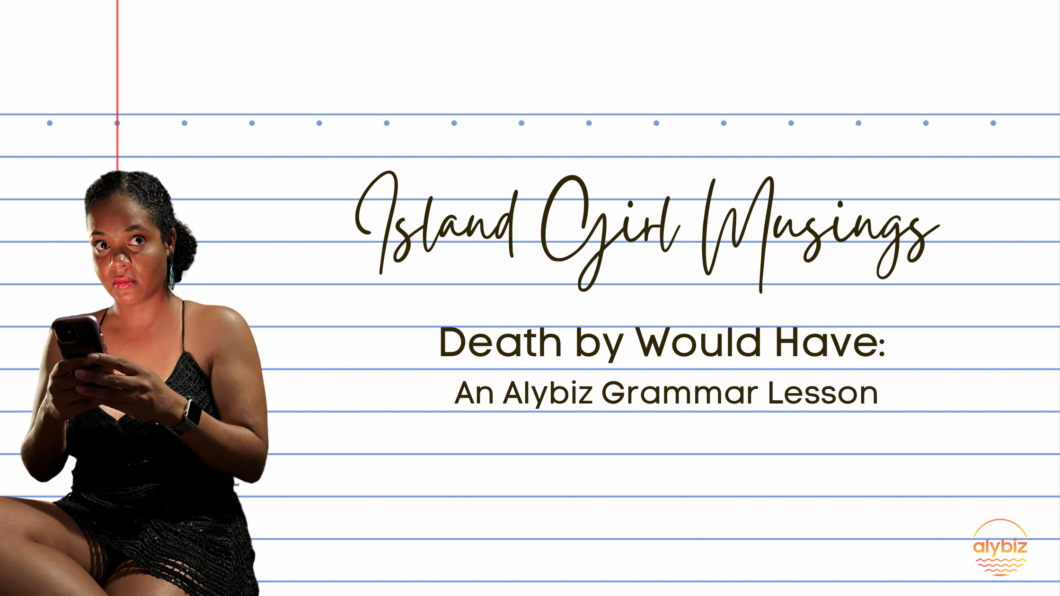Today’s Lesson: Death by Would Have
I’ll never forget the first time I was confronted by what I now call the “would have phenomenon”. I was fresh out of undergrad at my first ‘big girl’ job when one day, a telephone conversation went something like this:
Me: Hello, Marketing Department, this is Alyssa.
Caller: Hi, yes. I am calling from [REDACTED] in connection with an email I would have sent yesterday.
Me: Oh? Why didn’t you send the email?
Caller: I’m sorry?
Me: You said you would have sent it. So I’m just wondering what stopped you from sending it?
Caller: ….
Me: ….
Caller: I sent it yesterday.
Me: Ummm. Ok, let me check.
Reader, this was 2009. I thought it was a fluke. One person’s slip of the tongue. Little did I know that this was the precursor to my death by would have.
As the years passed, my ears were assaulted by parliamentarians reporting on what their constituents would have received. I’m sorry, did they or did they not receive the water tanks/school bags/money in envelopes financial assistance?
Workshop facilitators said that participants would have received packages on arrival. Why didn’t they get them? Where did the packages go?
CEOs, managers and directors outlined their organizations’ achievements. “In 2018, we would have recorded [xx] profit,” they said. So, did you make a profit?
Intercol commentators talked about the impressive race that the athletes would have run. Sigh. This is going to be slow and painful, huh?
But perhaps the most egregious use (misuse?) of would have happened during a 7pm news broadcast on [REDACTED].
“The swimmer would have encountered difficulty and would have died.”

Around 2017 or so, the “would have phenomenon” began spreading at lightning speeds. Certainly much faster than my internet at home, but I digress. Lawyers, teachers, bankers, politicians, radio hosts and journalists were “would having” everywhere, sprinkling it all over like parsley. But this wasn’t just happening in Grenada. The “would have phenomenon” was plaguing the entire Caribbean. If we were to play “would have bingo”, you know, that game when you take a shot every time someone uses would have incorrectly in one speech, we’d all be drunk and blocking drains in no time.
Unable to ignore the [grammar] crime that was being committed around me, I found myself regularly climbing up on my soapbox and declaring “WOULD HAVE IS NOT USED FOR THE SIMPLE PAST TENSE!” Not all heroes wear capes, I know.

I wanted to know why so many people were confusing the rest of us about whether or not the action occurred, so I asked a few offenders. “I thought would have was more formal” was the consistent reply.
The problem with this, of course, is that using would have is not a formal way of reporting on an action that already happened. The simple past tense is just that…simple. There’s no formal or informal version of it.
In case you forgot, the simple past tense is the verb tense used to talk about what happened in the past. Here are some examples:
- I danced in the rain yesterday.
- Brandon called the house several times last Saturday.
- Shelly ate 10 mangoes on Tuesday.
- Last year, my cousin proposed to his girlfriend.
There is no doubt that the action took place. If we introduce the perfect conditional – would have or could have – into the sentence, we’re moving into new territory, the conditional tense.
The Conditional Tense
From Grammarbook.com, “The conditional tense—also sometimes referred to as the conditional mood—communicates what happens, will happen, might have happened, or would have happened if we do, will do, or did do something. The situation described can be real or imaginary; in either case, an action relies on something else (a condition).”
From Grammarly.com, “Conditional sentences are statements discussing known factors or hypothetical situations and their consequences. We use them to communicate that something is true or happens only if something else is true or happens—that is, only under a certain condition. Complete conditional sentences contain a conditional clause (often referred to as the if-clause) and the consequence.”
There are four (4) types of conditional sentences: zero conditional, first conditional, second conditional, and the one that applies to our “would have” plague, third conditional.
Third conditional sentences, according to Oxford Language Club, talk about the past. The third conditional is used to “describe a situation that didn’t happen, and to imagine the result of this situation.” In the case of the third conditional, the words would have or could have, i.e. the perfect conditional, are used to express something that was possible in the past but did NOT happen.

Here are a few examples:
- Jason would have passed the course if he had shown up to class.
- If I had taken a taxi instead of the bus, I would not have missed my flight and I would be in Barbados right now.
- I would have gone to the beach yesterday, but I woke up after 11am and missed my chance. [True story. Remember during the ~pandemonium~ when beach access was only allowed from 5am – 11am?]
As you can see from these examples, there is no doubt that the action did not happen. Let’s look at another example:
“I would have submitted an application for grant funding for my hydroponics farm.”
Can you identify what’s wrong? Are you wondering whether or not I submitted the application?
Suppose I did submit the application, then the simple past tense is all I need:
“I submitted an application for grant funding for my hydroponics farm.”
But what if something got in the way and I didn’t actually submit my application:
“I would have submitted an application for grant funding for my hydroponics farm, but I got the submission dates confused and I missed the deadline.”
Basically, once you include would have in your sentence, you are suggesting that the action did not take place because something prevented that action from happening. That’s why it is incorrect to use the perfect conditional when speaking about an action that already happened.
Seriously though, how did we get here?
To be honest, I don’t know why “would have” became so prevalent or even where the idea that “would have” is the formal past tense came from. Maybe it has to do with the fact that so many people struggle with the usage of would and will. Just to note, would is not the formal version of will. (If you have trouble remembering when to use will or would, check out How to use will and would by Marlene Davis, author of Language Matters – Mastering the English Language for Trinis)
The third conditional does deal with the past, and perhaps that’s what has been confusing people. English is complicated, I know. But the simple past tense does not have to be.
What I do know is that if people in authority continue to use would have incorrectly, their audiences will continue to mimic them and we will continue to wonder whether or not the [insert action here] occurred. Bright side? As a professional proofreader, I don’t often encounter would have used incorrectly in written work. Let’s keep it that way, please and thanks.
Side note: if you’re ready to pounce and argue that the rules don’t matter and using would have in this way is a colloquialism, you can keep it. If you tell me that you would have sent the email yesterday, I am going to ask what stopped you from sending it. The entire point of communication is to be understood and everyone would having about the place is making that difficult. Oh, and by the way, the conditional tense exists in our Grenadian language and we definitely use it correctly.
To would have or not to would have?
If you’re guilty of the would have crime, you can still turn your life around and stop contributing to our death by would have. The next time you have to report on an action that already happened, remember that there’s no need for the would have. Don’t complicate things. Keep it simple.
P.S. For those of you who are new here and wondering who this writer thinks she is, welcome! I am Alyssa Bierzynski, a Grenadian writer and lover of language and literature. I have a Master’s degree in Public Communication and a Bachelor’s degree in Liberal Studies with a specialization in English Language. I spent 6 years teaching English at the university level and ran the institution’s writing centre, providing university-wide writing and communication skills support. These days, I offer professional proofreading and copyediting services. If you need a proofreader, let’s talk. You can find me here.


The Jamaican police have been driving me crazy over the last few years with their use of “would have”. I had assumed for a while that they simply were not certain whether the action had taken place. It is quite interesting that your survey revealed that people thought it was more formal. The simple past tense is just that, simple. Why complicate it with a past conditional?
I had no idea that I was a “would have” abuser! I used to read your posts in the past and giggle because “Certainly! That’s not me.”. I got the rudest awakening when in the middle of a webinar presentation, a friend drew it to my attention – talk about being embarrassed. I could not believe that I contributed to the abuse of the English language *face-palm*.
Thank you for your constant reminders, I’m more aware and appreciative now!